高三年级英语语法-虚拟语气全总结
(完整版)英语虚拟语气语法归纳总结
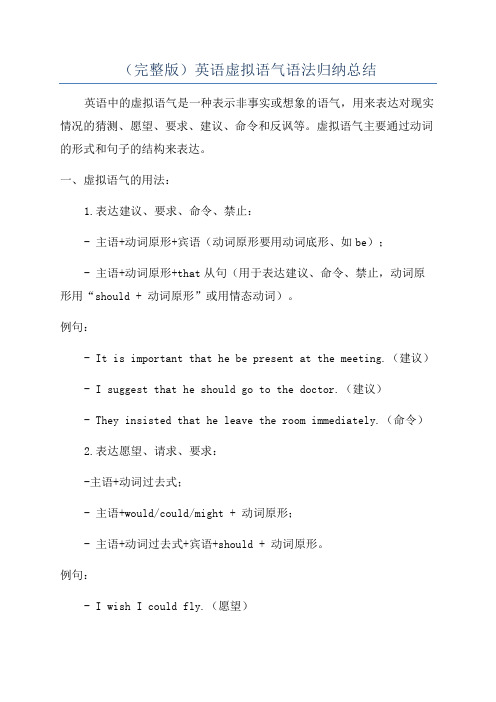
(完整版)英语虚拟语气语法归纳总结英语中的虚拟语气是一种表示非事实或想象的语气,用来表达对现实情况的猜测、愿望、要求、建议、命令和反讽等。
虚拟语气主要通过动词的形式和句子的结构来表达。
一、虚拟语气的用法:1.表达建议、要求、命令、禁止:- 主语+动词原形+宾语(动词原形要用动词底形、如be);- 主语+动词原形+that从句(用于表达建议、命令、禁止,动词原形用“should + 动词原形”或用情态动词)。
例句:- It is important that he be present at the meeting.(建议)- I suggest that he should go to the doctor.(建议)- They insisted that he leave the room immediately.(命令)2.表达愿望、请求、要求:-主语+动词过去式;- 主语+would/could/might + 动词原形;- 主语+动词过去式+宾语+should + 动词原形。
例句:- I wish I could fly.(愿望)- I would appreciate it if you could help me.(请求)3.表示虚拟条件:- If条件从句中的谓语动词用过去完成时,主句用would/should/might/could + have + 过去分词;- If条件从句中的谓语动词用过去时,主句用would/should/could + 动词原形。
例句:- If I had known his phone number, I would have called him.(虚拟条件)- If you had listened to me, we could have finished the project earlier.(虚拟条件)4.表达建议、要求、祝愿:- If only内部称述 + 主语 + 过去式。
英语语法 虚拟语气的知识点归纳
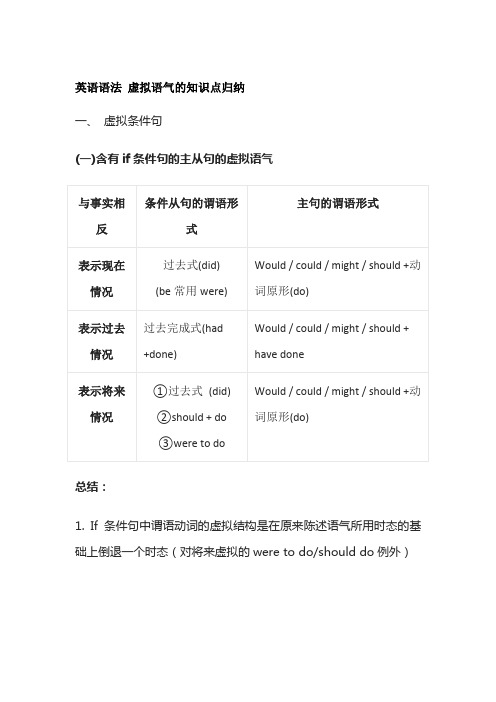
英语语法虚拟语气的知识点归纳一、虚拟条件句(一)含有if条件句的主从句的虚拟语气总结:1. If 条件句中谓语动词的虚拟结构是在原来陈述语气所用时态的基础上倒退一个时态(对将来虚拟的were to do/should do例外)2. 主句要借助于情态动词的过去式,后跟动词原形(现在或将来)或have done(过去);if条件句中只出现一个情态动词,即对将来虚拟的should.3.做此类题目时一定要分清是从句还是主句谓语动词的虚拟,还要把握好时态。
注意:1. 在虚拟条件从句中,动词“be”的过去时态一律用”were”,不用was。
2. 在虚拟条件状语中如果有were, should, had这三个词中任何一个,可省略if,把这三个词提到主语之前, 变成:were/should/had +主语+剩余成分。
3.在虚拟条件状语从句中,省略连词的倒装形式的句首不能用动词的缩略形式。
如我们可说Were I not to do., 而不能说Weren‘t I to do。
4.在表示与将来事实相反的条件句中,只能用should,而不能用would,could和might 等。
5.主句中的should通常用于第一人称,would,could以及might 可以用于各种人称eg :①If I were a bird, I could fly in the air.如果我是一只小鸟,我就能在空中飞行。
②I wish I could pass the examination.我希望我能通过考试。
在虚拟条件句中,对于与将来事实相反的情形,请注意以下几点:(1)条件从句表示的内容与将来事实相反,实为对将来情况的推测,用过去时表示虚拟;(2)条件从句谓语除用过去式外,有时也用“should+动词原形(表示可能性极小,常译为“万一”)”或“were to+动词原形(表示与将来事实相反的假设)”;(3)条件从句使用“should+动词原形”这样的谓语形式时,主句谓语除可用“should (would, could, might)+动词原形”这样的虚拟语气形式外,也可用直陈语气或祈使语气。
高中必备知识点解析虚拟语气的形式与用法

高中必备知识点解析虚拟语气的形式与用法虚拟语气是高中英语必备的语法知识点之一。
它在英语中经常被用于表达假设、愿望、建议、命令和推测等情态,通过使用虚拟语气,可以使语言更加丰富和准确。
本文将深入解析虚拟语气的形式与用法。
一、虚拟语气的形式1. 虚拟语气的一般现在时:用于表示与现在事实相反的情况。
其结构为:主语+动词原形(倒装)。
例如:If I were you, I would study harder.(如果我是你,我会更加努力学习。
)2. 虚拟语气的一般过去时:用于表示与过去事实相反的情况。
其结构为:主语+动词过去式(倒装)。
例如:If I had seen her yesterday, I would have said hello.(如果我昨天见到她,我会问好的。
)3. 虚拟语气的过去完成时:用于表示对过去情况的猜测或不可能发生的情况。
其结构为:主语+动词过去完成式(倒装)。
例如:I wish I had studied harder for the exam.(我希望我为考试努力学习。
)二、虚拟语气的用法1. 表达假设与条件:If I were you, I would travel around the world.(如果我是你,我会环游世界。
)I wish I had a million dollars.(我希望我有一百万美元。
)2. 表达愿望与建议:I wish you would stop smoking.(我希望你戒烟。
)It's important that she arrive on time.(她按时到达很重要。
)3. 表达命令与要求:The teacher ordered that the students be quiet.(老师要求学生们保持安静。
)She insisted that he leave immediately.(她坚持要他立刻离开。
)4. 表达推测与猜测:He looks as if he were sick.(他看起来像是生病了。
高三英语虚拟语气知识点
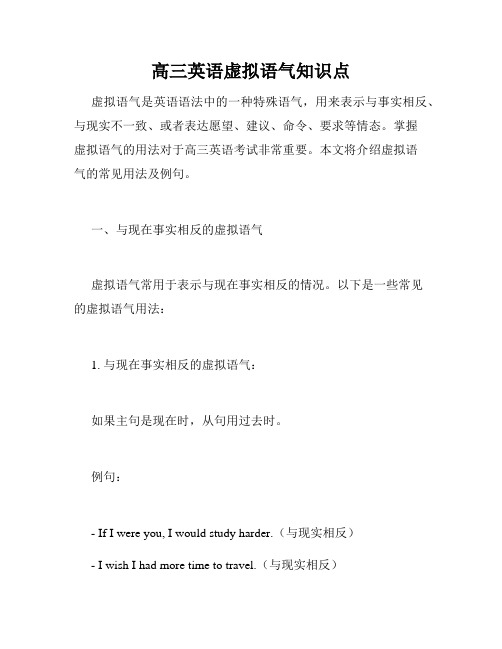
高三英语虚拟语气知识点虚拟语气是英语语法中的一种特殊语气,用来表示与事实相反、与现实不一致、或者表达愿望、建议、命令、要求等情态。
掌握虚拟语气的用法对于高三英语考试非常重要。
本文将介绍虚拟语气的常见用法及例句。
一、与现在事实相反的虚拟语气虚拟语气常用于表示与现在事实相反的情况。
以下是一些常见的虚拟语气用法:1. 与现在事实相反的虚拟语气:如果主句是现在时,从句用过去时。
例句:- If I were you, I would study harder.(与现实相反)- I wish I had more time to travel.(与现实相反)2. 表达建议、要求或命令等的虚拟语气:主句用“should”或“ought to”引导,从句用动词原形。
例句:- It is necessary that she should arrive on time.(建议)- He demanded that they leave immediately.(命令)二、与过去事实相反的虚拟语气虚拟语气还可以用来表示与过去事实相反的情况。
以下是一些常见的虚拟语气用法:1. 与过去事实相反的虚拟语气:如果主句是过去时,从句用过去完成时。
例句:- If he had studied harder, he would have passed the exam.(与过去事实相反)- I wish I hadn't eaten so much.(与过去事实相反)2. 表达愿望、建议或命令等的虚拟语气:主句用“should”或“ought to”引导,从句用动词原形或过去时。
例句:- It is high time that he applied for a job.(建议)- I wish he would stop talking.(愿望)三、与将来事实相反的虚拟语气虚拟语气还可以用来表示与将来事实相反的情况。
以下是一些常见的虚拟语气用法:1. 与将来事实相反的虚拟语气:如果主句是将来时,从句用过去完成时。
高三英语语法讲解----虚拟语气

(1)表示说话人所说的话不是事实,而是一种假设、猜测、怀疑 等,假设是不可能或者不大可能发生或实现的;
(2)表示说话人的愿望、要求、命令、建议等
02 related concept
虚拟语气的基本用法:
if条件句中的虚拟语气:
虚拟语气的基本用法:
在if引导的虚拟条件状语从句中,谓语动词含有had、were、should时, 可以把if省略,将had、were、should、could提到句首,变成倒装句。 If I were in your position,I would do the same. →Were I in your position,I would do the same. 假如我处在你的位置,我也会这样干的。 If you had come earlier,you would have caught the bus. →Had you cght the bus. 如果你来得早些,你就会赶上公共汽车了。 If it should rain tomorrow,we would not go climbing. →Should it rain tomorrow,we would not go climbing. 如果明天下雨的话,我们就不去爬山了。
If从句
与现在相反
did(be用were)
与过去相反 与将来相反
had +done
did(be用were) were to+ do should +do
主句
would /should /could / might
+do
would /should /could / might +have + done
虚拟语气用法总结(完整)
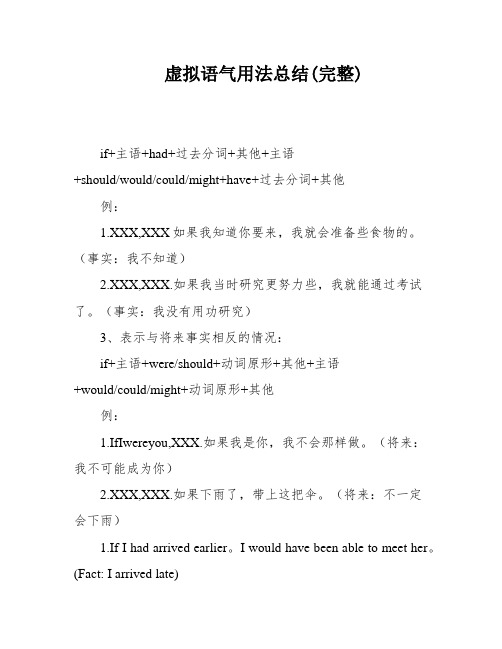
虚拟语气用法总结(完整)if+主语+had+过去分词+其他+主语+should/would/could/might+have+过去分词+其他例:1.XXX,XXX如果我知道你要来,我就会准备些食物的。
(事实:我不知道)2.XXX,XXX.如果我当时研究更努力些,我就能通过考试了。
(事实:我没有用功研究)3、表示与将来事实相反的情况:if+主语+were/should+动词原形+其他+主语+would/could/might+动词原形+其他例:1.IfIwereyou,XXX.如果我是你,我不会那样做。
(将来:我不可能成为你)2.XXX,XXX.如果下雨了,带上这把伞。
(将来:不一定会下雨)1.If I had arrived earlier。
I would have been able to meet her。
(Fact: I arrived late)2.If he had XXX my advice。
he would not have made such a mistake。
(Fact: He didn't listen to me)3.If he were to come here tomorrow。
I would talk to him。
(Fact: It's XXX he will come)In expressing ns。
orders。
requests。
etc。
the subjunctive mood is often used in the object clause。
with the verb in the form of "should + infinitive," which can be omitted.Other uses of XXX:1.The subjunctive mood is used in the object clause after "wish" to express a XXX fact。
高考语法虚拟语气

高考语法虚拟语气虚拟语气在高考语法考试中占据很重要的位置。
虚拟语气是用来表示非真实的、不确定的、假设的情况,或表达愿望、建议、命令等的语气。
下面我将详细介绍虚拟语气的各种形式及其用法。
一、虚拟语气的情态动词虚拟语气通常由情态动词来表示,包括:1. should + 动词原形,可以表示建议或命令。
2. would + 动词原形,可以表示请求或愿望。
3. could + 动词原形,可以表示能力、请求或愿望。
4. might + 动词原形,可以表示可能性。
5. had + 过去分词,可以表示对过去情况的假设。
6. were + 动词原形,多用于第二和第三人称单数的句子中,表示假设或愿望。
二、虚拟语气的用法1. 虚拟条件句虚拟条件句常用在表示条件的从句中,表示与现在或将来事实相反的假设情况。
主句中常使用情态动词或“would”来表示假设的结果。
例句1:If I were a bird, I would fly in the sky.(假设的情况是我是一只鸟,结果是我会在天空中飞翔。
)例句2:If you had studied harder, you would have passed the exam.(假设的情况是你学习更努力了,结果是你已经通过考试了。
)2. 虚拟语气用于表达命令、建议、要求、要求等虚拟语气还常用于表达命令、建议、要求等。
在这种情况下,常用“should + 动词原形”或“would + 动词原形”。
例句3:You should help your parents with the housework.(你应该帮助你的父母做家务。
)例句4:I wish you would listen to me.(我希望你能听我说。
)3. 虚拟语气用于表达愿望虚拟语气还常用于表达愿望,其中“would”是常见的情态动词。
例句5:I wish I could play the piano.(我希望我能弹钢琴。
英语语法—虚拟语气(最全)
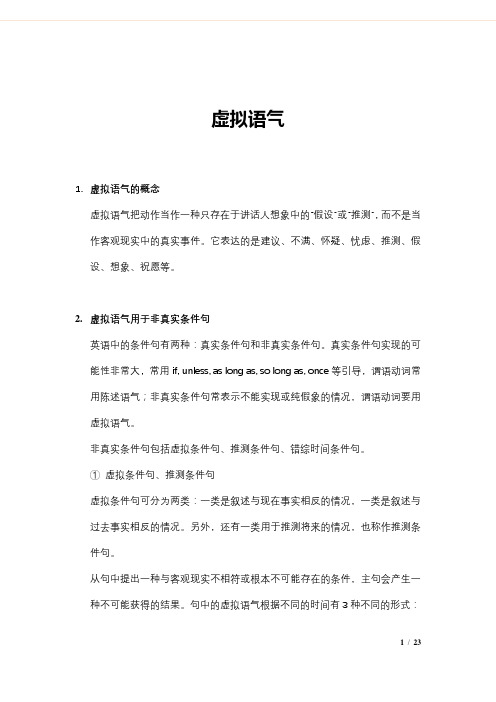
虚拟语气1.虚拟语气的概念虚拟语气把动作当作一种只存在于讲话人想象中的“假设”或“推测”,而不是当作客观现实中的真实事件。
它表达的是建议、不满、怀疑、忧虑、推测、假设、想象、祝愿等。
2.虚拟语气用于非真实条件句英语中的条件句有两种:真实条件句和非真实条件句。
真实条件句实现的可能性非常大,常用if, unless, as long as, so long as, once等引导,谓语动词常用陈述语气;非真实条件句常表示不能实现或纯假象的情况,谓语动词要用虚拟语气。
非真实条件句包括虚拟条件句、推测条件句、错综时间条件句。
①虚拟条件句、推测条件句虚拟条件句可分为两类:一类是叙述与现在事实相反的情况,一类是叙述与过去事实相反的情况。
另外,还有一类用于推测将来的情况,也称作推测条件句。
从句中提出一种与客观现实不相符或根本不可能存在的条件,主句会产生一种不可能获得的结果。
句中的虚拟语气根据不同的时间有3种不同的形式:I would lend him the money if he asked me.他要是问我,我愿意借钱给他。
(意愿)If he had time, he should do it.要是有时间,他愿意做那件事。
(意愿)He could move the big stone if he should try.努力的话,他能搬动那块大石头。
(能力)If he forgot to come, you could go instead.他要是忘了没来,你可要替他来。
(许诺)A.与现在事实相反If I had enough money, I would buy a computer.如果我有足够的钱,我将买一台电脑。
(实际上没有) Were I you I would refuse.如果我是你我会拒绝。
(我不是你)注:从句有时可用If it were not for这种句型,表示“若不是……”。
It it weren’t for your help, we would be in serious trouble.若不是你帮忙,我们会遇到大麻烦。
- 1、下载文档前请自行甄别文档内容的完整性,平台不提供额外的编辑、内容补充、找答案等附加服务。
- 2、"仅部分预览"的文档,不可在线预览部分如存在完整性等问题,可反馈申请退款(可完整预览的文档不适用该条件!)。
- 3、如文档侵犯您的权益,请联系客服反馈,我们会尽快为您处理(人工客服工作时间:9:00-18:30)。
虚拟语气在非真实条件句中①错综时间条件句:当条件状语从句表示的行为和主句表示的行为所发生的时间不一致时,被称为错综时间条件句,动词的形式要根据它表示的时间作出相应的调整。
如:If you had followed my advice just now, you would be better now.If you had studied hard before, you would be a college student now.②if省略句在条件句中可以省略if, 把were, had, should提到句首,变成倒装句式。
否定句时not留在原来位置不变。
如:If I were at school again, I would study harder.→Were I at school again, I would study harder.如果我还有上学的机会,我会更加努力学习。
If you had come earlier, you would catch the bus.→Had you come earlier, you would catch the bus.如果你来得早点,你就能赶上公共汽车。
If it should rain tomorrow, we would not go climbing.→Should it rain tomorrow, we would not go climbing.如果明天下雨的话,我们就不能登山去了。
③用介词代替条件状语从句常用的介词有with, without, but for。
如:What would you do with a million dollars? (=if you had a million dollars)如果你有100万元,你会做什么?We couldn’t have finished the work ahead of time without your help. (=if we hadn’t got your help) 没有你的帮助,我们不可能提前完成这项工作。
Without your help, we couldn’t have finished the work ahead of time.= But for your help, …= If it had not been for your help, …= Had it not been for you help, …没有你的帮助,我们不可能提前完成这项工作。
④含蓄条件句有时在虚拟语气中并不总是出现if引导的条件句,而是通过其他手段来代替条件句。
如:I was ill that day. Otherwise, I would have taken part in the sports meeting. (副词)He telephoned to inform me of your birthday, or I would have known nothing about it. (连词)A man who stopped drinking water would be dead in about seven days. (定语从句)I might have given you more help, but I was too busy. (连词)Everything taken into consideration, they would have raised their output quickly. (独立主格结构) ⑤even if, even though也可用于虚拟语气,其形式与if 从句在虚拟语气中的形式相同。
习题1. If my lawyer___here last Saturday, he___me from going.A.had been, would have preventedB.had been, would preventC.were, would preventD.were, would have prevented2. If it___for the snow, we___the mountain yesterday.A.were not, could have climbedB.were not, could climbC.had not been, could have climbedD.had not been, could climb3. Without electricity(电) human life___quite difficult today.A. isB. will beC. would have beenD. would be4. I didn’t see your sister at the meeting, if she___, she would have met my brother.A. has comeB. did comeC. cameD. had come5. When the pencil is partly in a glass of water, it looks as if it___.A. breaksB. has brokenC. were brokenD. had been broken6. He hesitated(犹豫) for a moment before kicking(踢) the ball. Otherwise he___a goal.A. had scoredB. scoredC. would scoreD. would have scored7. ___right now, she would get there on Sunday.A.Would she leaveB.If she leavesC.Were she to leaveD.If she had left8. Had he worked harder, he___the exam.A.must have got throughB.would have got throughC.would get throughD.could get through9. He must have had an accident, or he___then.A.would have been hereB.had to be hereC.should be hereD.would be here10. ___for my illness I would have lent him a helping hand.A.Not beingB.Had it not beenC.Without beingD.Not having been11. We didn’t know his telephone number, otherwise we___him.A.would have calledB.must have telephonedC.would telephoneD.had telephoned虚拟语气(1)复习题1.He ___you more help, even though he was very busy.A. might have givenB. might giveC. may have givenD. may give2.___for your laziness(懒惰), you could have finished the assignment(任务) bynow.A. Had it not beenB. It were notC. weren’t itD. Had not it been3.If I hadn’t stood under the ladder(梯子) to catch you when you fell, you ___now.A. wouldn’t be smilingB. couldn’t have smiledC. won’t smileD. didn’t smile4.If it ___Professor Johnson’s recommendation(推荐), I wouldn’t have been admitted to the graduate school(研究生学院).A. were not forB. had not been forC. were notD. had it not been5.If we do not develop a new kind of car, air pollution ___even more dangerous.A. should have becomeB. will becomeC. would have becomeD. must have become6.But for the stormy weather, we ___earlier.A. should arriveB. shall arriveC. should have arrivedD. shall have arrived7.If we ___their terms(条款,条件), we would go bankrupt(破产).A. acceptB. should acceptC. had acceptedD. are to accept8.John would never have gone to the hospital ___that Tom would be there, too.A. he did not knowB. if had he knownC. had he knownD. he would have known9.Had he been more careful, he ___that accident.A. would avoidB. would have avoidedC. avoidedD. should avoid10.But that he came to help me, I ___there earlier.A. could not arriveB. could not have arrivedC. did not arriveD. can not arrive11.She could look more attractive(有魅力的,吸引人的) but she ___no attention to her clothes.A. paysB. was payingC. paidD. had paid12.If I ___in his place, I would do that, too.A. wasB. wereC. amD. had been虚拟语气(2)——虚拟语气在名词从句中1.在由suggest, demand, require, request, insist, order, command, propose等表示建议、请求、命令、愿望等动词或其同根词引出的名词从句中,名词从句虚拟句的谓语变化的形式只有一条规律——名词从句虚拟句无论其主句的谓语动词时何种形式,从句的谓语形式均为should+动词原形,其中should可以省去。
